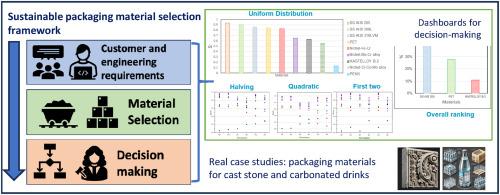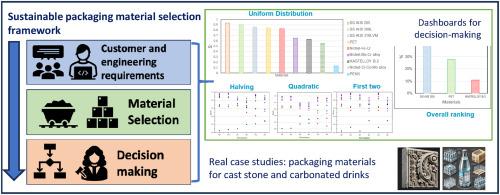Selecting sustainable packaging materials and strategies: A holistic approach considering whole life cycle and customer preferences
IF 9.7
1区 环境科学与生态学
Q1 ENGINEERING, ENVIRONMENTAL
引用次数: 0
Abstract
With the increasing public awareness of packaging and the environmental impact caused by it, companies are driving their businesses to introduce and promote practices that help ease the negative impact of packaging on the environment. Studies done on consumer behaviour show that decisions nowadays are influenced by sustainability. Yet, companies struggle with changing practices and justifying adopting environmentally friendly packaging materials. The current paper presents a holistic approach, addressing the need for identifying, assessing, and selecting sustainable materials for packaging applications. The Kano model prioritises features that are then used with Ashby plots for identifying alternative materials. Life cycle assessment, as well as life cycle costing, are used for assessing the environmental and financial impact of the use of such materials. Automatically weighted Multi-Criteria Decision-Making Analysis (MCDA) is used to select the most appropriate packaging material. This methodology provides a combinatorial ranking for each criterion set by four pre-defined weight distributions for Technique for Order Preference by Similarity to the Ideal Solution (TOPSIS). The proposed methodology allows for a systematic and holistic design process when deciding on packaging materials for any product. The methodology is validated for the case of packaging weather-sensitive cast stone products and carbonated drinks. In cast stone, three packaging materials are ranked for pallets based on their attributes. Similarly, for carbonated drinks, three packaging materials are recommended at the end of the study.


选择可持续包装材料和策略:考虑整个生命周期和客户偏好的整体方法
随着公众对包装及其造成的环境影响的认识不断提高,各公司正在推动其业务引入和推广有助于减轻包装对环境的负面影响的做法。对消费者行为的研究表明,如今的决策受到可持续发展的影响。然而,企业在改变做法和证明采用环保包装材料的合理性方面却举步维艰。本文提出了一种整体方法,以满足识别、评估和选择可持续包装材料的需求。卡诺(Kano)模型确定了各种特征的优先次序,然后与阿什比(Ashby)图一起用于确定替代材料。生命周期评估和生命周期成本计算用于评估使用这些材料对环境和财务的影响。自动加权多标准决策分析(MCDA)用于选择最合适的包装材料。该方法通过与理想解决方案相似性排序偏好技术(TOPSIS)的四个预定义权重分布,为每个标准集提供组合排序。在决定任何产品的包装材料时,所提出的方法可实现系统化的整体设计过程。该方法在对天气敏感的铸石产品和碳酸饮料的包装案例中得到了验证。在铸石产品中,根据三种包装材料的属性对托盘进行了排序。同样,在碳酸饮料方面,研究结束时也推荐了三种包装材料。
本文章由计算机程序翻译,如有差异,请以英文原文为准。
求助全文
约1分钟内获得全文
求助全文
来源期刊

Journal of Cleaner Production
环境科学-工程:环境
CiteScore
20.40
自引率
9.00%
发文量
4720
审稿时长
111 days
期刊介绍:
The Journal of Cleaner Production is an international, transdisciplinary journal that addresses and discusses theoretical and practical Cleaner Production, Environmental, and Sustainability issues. It aims to help societies become more sustainable by focusing on the concept of 'Cleaner Production', which aims at preventing waste production and increasing efficiencies in energy, water, resources, and human capital use. The journal serves as a platform for corporations, governments, education institutions, regions, and societies to engage in discussions and research related to Cleaner Production, environmental, and sustainability practices.
 求助内容:
求助内容: 应助结果提醒方式:
应助结果提醒方式:


